
Alex Salmond is has pulled out of a scheduled appearance to give evidence to the Holyrood committee examining the Scottish Government’s unlawful investigation of sexual harassment allegations made against him.
The inquiry was established after Scotland’s former first minister successfully challenged the Government’s apparently biased investigation, resulting in a £512,250 payout.
The inquiry has now been thrown into turmoil, though Mr Salmond could still reschedule.
Here are the key dates as the saga unfolded:
– 2017
– October 31
First Minister Nicola Sturgeon orders a review of the Scottish Government’s “policies and processes for addressing inappropriate conduct” in the wake of the MeToo movement.
The review is led by the Government’s most senior civil servant, Permanent Secretary Leslie Evans.
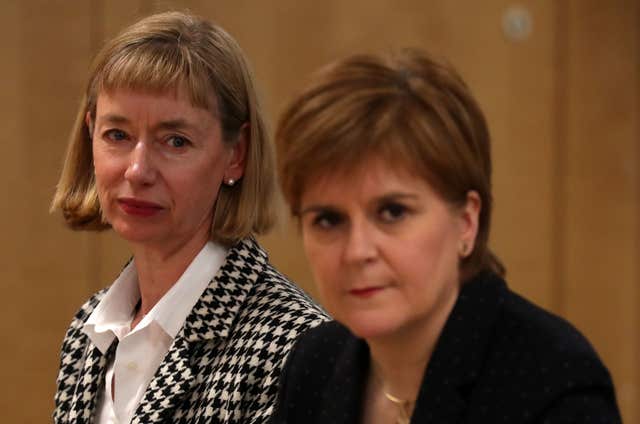 First Minister Nicola Sturgeon, right, and Permanent Secretary Leslie Evans (Andrew Milligan/PA)
First Minister Nicola Sturgeon, right, and Permanent Secretary Leslie Evans (Andrew Milligan/PA)
– November 4
Ms Sturgeon is informed about an inquiry by Sky News relating to Mr Salmond’s alleged behaviour towards female staff at Edinburgh Airport.
– December 20
Ms Sturgeon approves the “Handling of Harassment Complaints Involving Current or Former Ministers” procedure.
– 2018
– January
Two female staff members make formal complaints to the Scottish Government about Mr Salmond’s conduct in December 2013 when he was first minister.
An internal investigation is established and investigating officer Judith Mackinnon is appointed.
– March 7
The Permanent Secretary tells Mr Salmond about the investigation.
– March 29
Mr Salmond’s former chief of staff, Geoff Aberdein, meets Ms Sturgeon at Holyrood and discusses the allegations.
READ MORE: Alex Salmond pulls out of Holyrood inquiry
In her written evidence to the committee in 2020, Ms Sturgeon says she forgot about this meeting until “late January/early February” 2019.
– April 2
Mr Salmond meets Ms Sturgeon at her home in Glasgow and tells her that he is under investigation.
In Mr Salmond’s later written evidence, he states the First Minister “suggested that she would intervene in favour of a mediation process at an appropriate stage” but subsequently decided against intervening.
Ms Sturgeon has argued she thought this was a party meeting, rather than a Government one.
– April 23
Mr Salmond calls Ms Sturgeon twice, asking her to encourage the Permanent Secretary to accept his mediation request.
– June 7
Ms Sturgeon meets Mr Salmond in Aberdeen, ahead of the SNP conference.
– July 14
Ms Sturgeon and Mr Salmond meet at the First Minister’s Glasgow home.
– August 21
The Crown Office passes complaints about Mr Salmond to police.
– August 22
Mr Salmond is told the Government inquiry is complete.
– August 23
The Scottish Government tells Mr Salmond’s lawyers it intends to release a public statement about the investigation, but agrees not to until an interim interdict application seeking to block publication has been heard.
The Daily Record newspaper breaks news of the allegations against Mr Salmond via a tweet.
He denies misconduct and calls some of the allegations “patently ridiculous”.
Please see statement below. pic.twitter.com/LaTKotwdA8
— Nicola Sturgeon (@NicolaSturgeon) August 24, 2018
– August 28
Mr Salmond lodges a petition for a judicial review at the Court of Session in Edinburgh.
– August 29
Mr Salmond resigns from the SNP, but says he will apply to rejoin once he has cleared his name.
He launches a crowdfunding appeal for the review, which quickly reaches more than £100,000.
– September 14
Police confirm they have launched an investigation into the complaints against Mr Salmond, separate from the Government’s investigation and the judicial review process.
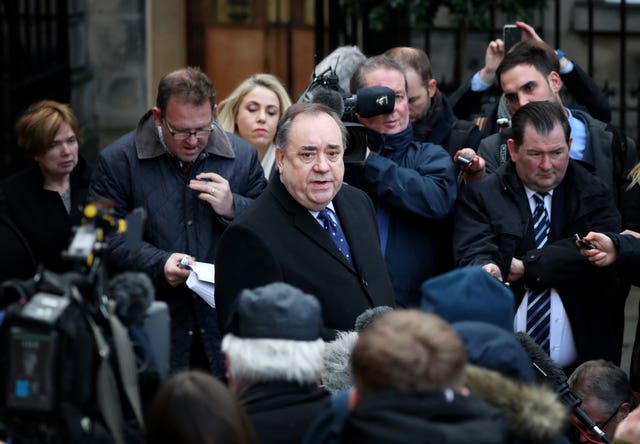 Alex Salmond speaking outside the Court of Session in Edinburgh after it ruled the Scottish Government acted unlawfully regarding sexual harassment complaints against him (Jane Barlow/PA)
Alex Salmond speaking outside the Court of Session in Edinburgh after it ruled the Scottish Government acted unlawfully regarding sexual harassment complaints against him (Jane Barlow/PA)
– 2019
– January 8
A week before the full judicial review is due to start, the Scottish Government concedes defeat at the Court of Session in Edinburgh.
The Government’s lawyers accept that investigating officer Ms Mackinnon has had previous contact with the complainers.
The court concludes the investigation was “unlawful” and “tainted by apparent bias”.
Ms Evans releases a statement apologising to “all involved” and Mr Salmond calls for her to consider her position.
– January 13
Ms Sturgeon refers herself to independent advisers to rule on whether she breached the ministerial code in her meetings with Mr Salmond.
– January 15
MSPs agree to hold a Holyrood inquiry into the Government’s handling of the complaints against Mr Salmond.
– January 23
Police Scotland arrest Mr Salmond.
– January 24
Mr Salmond appears at Edinburgh Sheriff Court and is charged with several sexual offences, including attempted rape, which he denies.
August 2
The Scottish Government pays £511,250 to Mr Salmond in connection with the judicial review.
– 2020
– February 26
The Scottish Parliament Committee on the Scottish Government Handling of Harassment Complaint meets for the first time.
– March 9
Mr Salmond’s criminal trial starts at the High Court in Edinburgh.
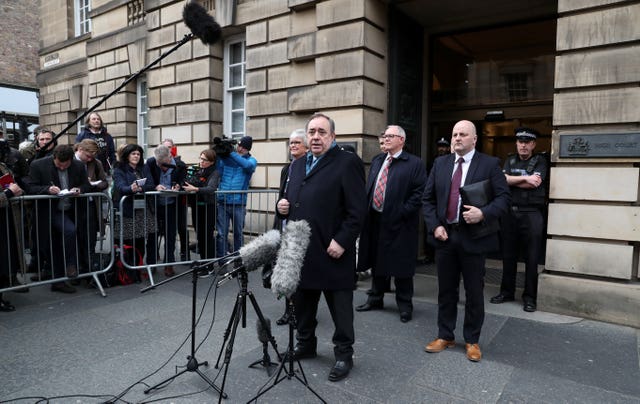 Alex Salmond speaks outside the High Court in Edinburgh after he was cleared of attempted rape and a series of sexual assaults (Andrew Milligan/PA)
Alex Salmond speaks outside the High Court in Edinburgh after he was cleared of attempted rape and a series of sexual assaults (Andrew Milligan/PA)
– March 23
Mr Salmond is acquitted on all charges.
The jury returns not guilty verdicts on 12 charges, including attempted rape, and a further not proven verdict is returned on a charge of sexual assault with intent to rape.
– August 18
The Committee on the Scottish Government Handling of Harassment Complaints hears evidence from its first witness, the Permanent Secretary.
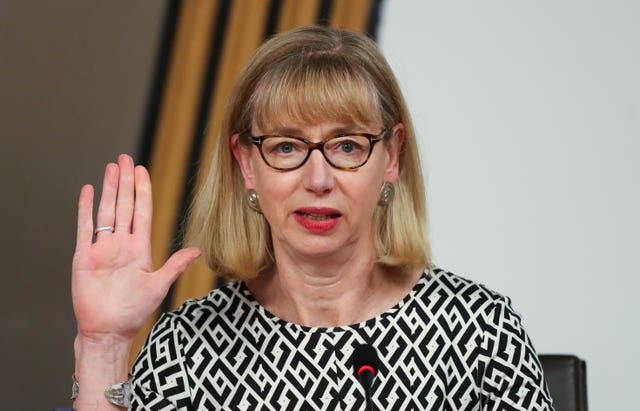 Permanent Secretary Leslie Evans gives evidence to the Scottish Parliament committee examining the handling of harassment allegations (Russell Cheyne/PA)
Permanent Secretary Leslie Evans gives evidence to the Scottish Parliament committee examining the handling of harassment allegations (Russell Cheyne/PA)
– September 29
Committee convener Linda Fabiani warns their investigation is being “completely frustrated” by a lack of evidence from key witnesses, and accuses the Scottish Government of “obstruction”.
– November 4
The Scottish Parliament passes a motion demanding the Government reveals the legal advice it received during the judicial review.
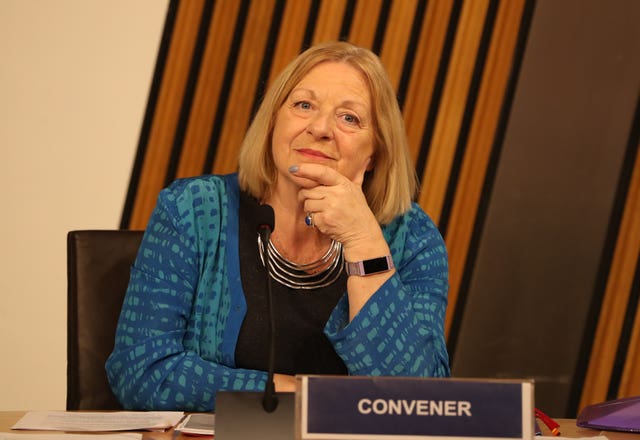 Linda Fabiani is convener of the Committee on the Scottish Government Handling of Harassment Complaints (Andrew Milligan/PA)
Linda Fabiani is convener of the Committee on the Scottish Government Handling of Harassment Complaints (Andrew Milligan/PA)
– December 18
The inquiry into the Salmond affair reaches an agreement with the Scottish Government over access to previously undisclosed material.
– 2021
– January 13
Mr Salmond rejects an invitation to appear before the committee in person on February 19, citing public health grounds.
– January 20
Mr Salmond alleges the Scottish Government’s “reprehensible” failure to release “crucial” documents had put him at a disadvantage in both his criminal trial and legal challenge against the Government’s investigation.
In written evidence to the committee, he says his legal team will ask the Lord Advocate whether the Government was in contempt of court over the “withholding of relevant evidence”.
– January 26
Mr Salmond refuses another offer to appear before the committee the following week.
– January 27
The committee offers a final date – February 8 – for Mr Salmond to appear to give evidence.
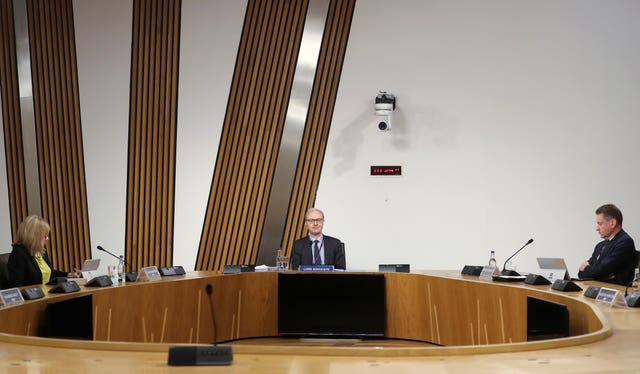 Lord Advocate James Wolffe gives evidence to the Committee on the Scottish Government Handling of Harassment Complaints (Russell Cheyne/PA)
Lord Advocate James Wolffe gives evidence to the Committee on the Scottish Government Handling of Harassment Complaints (Russell Cheyne/PA)
– January 29
The Crown Office confirms it has handed over evidence to the Holyrood inquiry.
It allows the unprecedented step of MSPs issuing a notice to the Crown Office under part of the Scotland Act, demanding the release of documents detailing text or WhatsApp communications between SNP chief operating officer Susan Ruddick and Scottish Government ministers, civil servants or special advisers.
It also asks for any documents linked to the leaking of complaints to the Daily Record newspaper in August 2018.
– February 3
Mr Salmond brands the behaviour of the current Scottish Government a “disgrace”, in a written submission to the inquiry.
He accuses Ms Evans of having a “bias” against him.
He also claims the “overwhelming likelihood” is that someone in the Government leaked details of the case against him to the press.
– February 8
Mr Salmond declines to appear before the harassment committee over concerns about the committee not publishing his evidence.
His submission, published elsewhere online, accused Ms Sturgeon of breaching the ministerial code with “false and manifestly untrue” statements to parliament, which she denies.
Mr Salmond’s lawyers say he “cannot take his oath to tell the whole truth and nothing but the truth” until a number of concerns were addressed, including the publication of the evidence by the committee and concerns about him being “in legal jeopardy”.
– February 9
By a vote of five to four, MSPs on the committee decide not to publish the submission or a redacted version of it.
– February 11
Lady Dorrian agrees to amend the wording of an order preventing the publication of information likely to identify any of the accusers in Mr Salmond’s trial to avoid a risk of any “misinterpretation” of its scope, following a Court of Session challenge by the Spectator magazine.
– February 17
Mr Salmond’s lawyers say he has “cleared Wednesday from his diary” ahead of a possible appearance before the committee on February 23.
– February 18
The Scottish Parliament’s Corporate Body (SPCB) agree “on balance” it would be “possible” for the document to be published.
– February 22
Mr Salmond’s evidence is published online.
He claims there was a “malicious and concerted” attempt to see him removed from public life and accuses the First Minister of repeatedly misleading parliament and breaching the ministerial code.
The Crown Office writes to the SPCB expressing concern that the evidence could be in contempt of court.
– February 23
The SPCB agrees to replace the published evidence with a redacted version.
A new version is published, redacting five sections of the submission – a total of 474 words.
Mr Salmond’s lawyers write to the Scottish Parliament demanding to see the legal basis for the redactions and warn that the decision jeopardises plans for him to give oral evidence on Wednesday.
By early evening, the Scottish Parliament confirms that Mr Salmond has pulled out of his scheduled appearance the following day.



Why are you making commenting on The Herald only available to subscribers?
It should have been a safe space for informed debate, somewhere for readers to discuss issues around the biggest stories of the day, but all too often the below the line comments on most websites have become bogged down by off-topic discussions and abuse.
heraldscotland.com is tackling this problem by allowing only subscribers to comment.
We are doing this to improve the experience for our loyal readers and we believe it will reduce the ability of trolls and troublemakers, who occasionally find their way onto our site, to abuse our journalists and readers. We also hope it will help the comments section fulfil its promise as a part of Scotland's conversation with itself.
We are lucky at The Herald. We are read by an informed, educated readership who can add their knowledge and insights to our stories.
That is invaluable.
We are making the subscriber-only change to support our valued readers, who tell us they don't want the site cluttered up with irrelevant comments, untruths and abuse.
In the past, the journalist’s job was to collect and distribute information to the audience. Technology means that readers can shape a discussion. We look forward to hearing from you on heraldscotland.com
Comments & Moderation
Readers’ comments: You are personally liable for the content of any comments you upload to this website, so please act responsibly. We do not pre-moderate or monitor readers’ comments appearing on our websites, but we do post-moderate in response to complaints we receive or otherwise when a potential problem comes to our attention. You can make a complaint by using the ‘report this post’ link . We may then apply our discretion under the user terms to amend or delete comments.
Post moderation is undertaken full-time 9am-6pm on weekdays, and on a part-time basis outwith those hours.
Read the rules hereLast Updated:
Report this comment Cancel